|
|
|
Sort Order |
|
|
|
Items / Page
|
|
|
|
|
|
|
| Srl | Item |
| 1 |
ID:
118922


|
|
|
|
|
| Publication |
2013.
|
| Summary/Abstract |
Along with the establishment of the Department of Public Health in 1912, the implementation of public health policies became an integral part of city management in Republican Guangzhou. Yet the cholera outbreak of 1932 fully exposed the weaknesses of the medical and sanitary infrastructure of the city. Due to the Guangzhou government's inaction, the Fangbian Hospital, a local charitable hall founded in response to the bubonic plague of the 1890s, involuntarily took over the major responsibility for providing medical services for cholera patients in the early stage of the epidemic. Only after the death of hundreds of patients and Guangzhou being described as a 'world of horror' in the local press did the government-run hospital start to take a more active role. Epidemics have always served as catalysts for change in public health perceptions and practices. This paper attempts to explain how the cholera epidemic of 1932 changed the role of public health in the urban administration of the city. Emphasis is placed on analysing how the people of Guangzhou began to fight for a supply of clean drinking water once they came to realize the link between water and the spread of the fatal cholera epidemic in 1932. Clean water, which used to be seen as a commodity enjoyed by the privileged few, was now increasingly regarded as a citizen's right.
|
|
|
|
|
|
|
|
|
|
|
|
|
|
|
|
| 2 |
ID:
102170


|
|
|
| 3 |
ID:
172009


|
|
|
|
|
| Summary/Abstract |
In 1817–21, the Indian subcontinent was ravaged by a series of epidemics which marked the beginning of what has since become known as the First Cholera Pandemic. Despite their far-reaching consequences, these epidemics have received remarkably little attention and have never been considered as historical subjects in their own right. This article examines the epidemics of 1817–21 in greater detail and assesses their significance for the social and political history of the Indian subcontinent. Additionally, it examines the meanings that were attached to the epidemics in the years running up to the first appearance of cholera in the West. In so doing, the article makes comparisons between responses to cholera in India and in other contexts, and tests the applicability of concepts used in the study of epidemics in the West. It is argued that the official reaction to cholera in India was initially ameliorative, in keeping with the East India Company's response to famines and other supposedly natural disasters. However, this view was gradually supplemented and replaced by a view of cholera as a social disease, requiring preventive action. These views were initially rejected in Britain, but found favour after cholera epidemics in 1831–32. Secondly, in contrast to later epidemics, it is argued that those of 1817–21 did little to exacerbate tensions between rulers and the ruled. On the rare occasions when cholera did elicit a violent reaction, it tended to be intra-communal rather than anti-colonial in nature.
|
|
|
|
|
|
|
|
|
|
|
|
|
|
|
|
| 4 |
ID:
145078


|
|
|
|
|
| Summary/Abstract |
The legalization of world politics is often celebrated for reducing impunity for those who contribute to humanitarian crises. This may sometimes be true but the opposite is also true. In 2010, United Nations peacekeepers unwittingly brought cholera to Haiti and sparked an epidemic. Nearly a million people were made sick and 8,500 died. Legal activists have sought to hold the UN responsible for the harms it caused and win compensation for the cholera victims. However, these efforts have been stymied by the structures of public international law—particularly UN immunity—which effectively insulate the organization from accountability. In short, the UN is empowered, and the cholera victims disempowered, by legalization. The Haiti case powerfully illustrates the dangers of legalism, which have been largely overlooked in discussions of international law, and suggests that law alone is an inadequate arbiter of responsibility in international politics.
|
|
|
|
|
|
|
|
|
|
|
|
|
|
|
|
| 5 |
ID:
177694


|
|
|
|
|
| Summary/Abstract |
This article presents an analysis of the first recognisably modern-style death registers in the Ottoman Empire. These were produced, in 1838–9, as a result of the state’s reaction to the cholera pandemic of 1831. This article shows how these registers were designed and structured, how they differed to those that preceded and came after them and so occupied a key point in the transition to the medicalisation of death and the import of Western-style statistical analysis. The article demonstrates how these registers offer details that can be used to build a picture of the social, economic and demographic profile of death in Istanbul in these years.
|
|
|
|
|
|
|
|
|
|
|
|
|
|
|
|
| 6 |
ID:
170056


|
|
|
|
|
| Summary/Abstract |
The cholera and plague pandemics of the 19th and early 20h centuries shaped Ottoman state-building and expansionist efforts in Iraq and the Gulf in significant ways. For Ottoman officials, these pandemics brought attention to the possible role of Qajar and British subjects in spreading cholera and plague, as well as the relationship between Iraq's ecology and recurring outbreaks. These developments paved the way for the expansion of Ottoman health institutions, such as quarantines, and the emergence of new conceptions of public health in the region. Specifically, quarantines proved instrumental not only to the delineation of the Ottoman–Qajar border, but also to defining an emerging Ottoman role in shaping Gulf affairs. Moreover, the Ottomans’ use of quarantines and simultaneous efforts to develop sanitary policies informed by local ecological realities signal a localized and ad hoc approach to disease prevention that has been overlooked. Ultimately, this study demonstrates that environmental factors operating on global and regional scales were just as important as geopolitical factors in shaping Ottoman rule in Iraq and the Gulf during the late Ottoman period.
|
|
|
|
|
|
|
|
|
|
|
|
|
|
|
|
| 7 |
ID:
131287


|
|
|
|
|
|
|
|